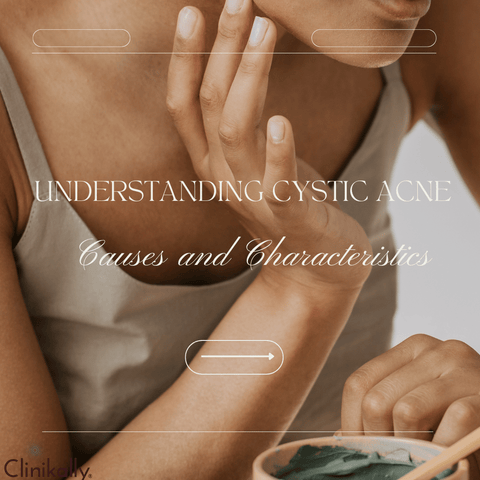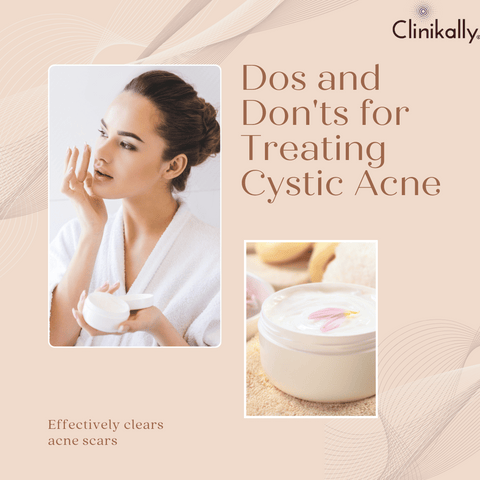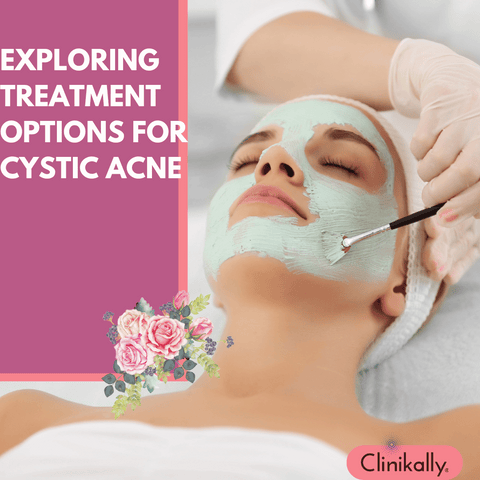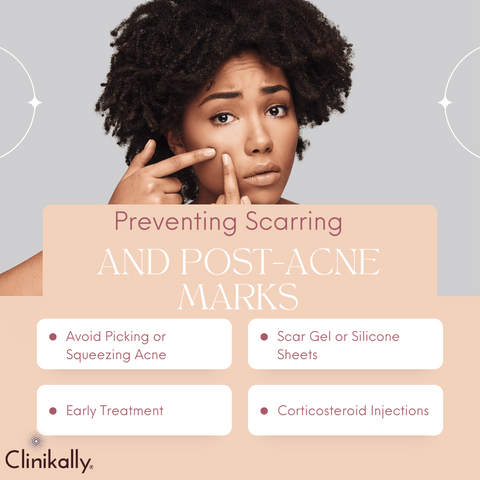Understanding Cystic Acne: Causes and Characteristics

A cystic acne is a severe form of acne characterized by large, painful, deep, and inflamed breakouts beneath the skin's surface. Understanding its causes and characteristics can help you manage and treat this difficult skin condition more effectively. Hormonal factors, excess sebum production, bacterial infection, genetic predisposition, and inflammatory response are all causes of cystic acne. It is important to remember that cystic acne is a medical condition, and self-treatment with over-the-counter products may not be enough to effectively manage it. If you have severe or persistent cystic acne, it is strongly advised that you seek professional advice from a dermatologist who can provide you with a personalized treatment plan to address your specific skin concerns. Early intervention can help reduce scarring and improve overall skin health.
What Sets Cystic Acne Apart from Other Forms of Acne?
Because of its intensity, unique traits, and severe problems, cystic acne differs from other types of acne. The depth of lesions, size, and swelling, redness and inflammation, lack of "heads", scarring potential, persistence and longevity, clustering in specific areas, psychological impact, increased risk of infection, and medical intervention are some key features that distinguish cystic acne from other types of acne. It is critical to distinguish cystic acne from other types of acne since treatment approaches can differ dramatically. To prevent scarring, minimize inflammation, and effectively manage cystic acne, a more aggressive and personalized treatment approach may be required. If you suspect you have cystic acne or are experiencing severe acne breakouts, you should consult a dermatologist for proper diagnosis and treatment.
The Role of Hormonal Imbalances in Cystic AcneHormonal imbalances play a significant role in cystic acne development and exacerbation. Changes in certain hormones can cause increased sebum production, clogged pores, and inflammation, all of which contribute to the formation of cystic acne lesions. The following are the main hormones involved in cystic acne development:
-
Androgens: Androgens are a class of male sex hormones found in both males and females, the most well-known of which is testosterone. There is often an increase in testosterone levels in cystic acne patients, which can stimulate the sebaceous glands to generate more sebum (oil). Excess sebum can combine with dead skin cells, clogging hair follicles and causing acne lesions, especially cystic acne.
-
Estrogen and Progesterone: Estrogen and progesterone are female sex hormones that help regulate the menstrual cycle. Fluctuations in these hormones, such as those seen during the menstrual cycle or pregnancy, can affect oil production in the skin and contribute to the development of cystic acne.
-
Hormonal Changes During Puberty: Hormone production, including androgens, increases during puberty, which can lead to increased sebum production and the onset of acne, including cystic acne.
-
Polycystic Ovary Syndrome (PCOS): PCOS is a female hormonal disorder characterized by elevated androgen levels, insulin resistance, and irregular menstrual cycles. Because of the hormonal imbalances associated with the condition, women with PCOS are more likely to develop cystic acne.
-
Hormonal Changes during the Menstrual Cycle: Many women experience premenstrual acne flare-ups due to hormonal changes occurring during the menstrual cycle. The increase in androgens and subsequent increase in sebum production can cause cystic acne breakouts around this time.
-
Hormonal Fluctuations during Pregnancy: Pregnancy is another period of hormonal fluctuation that can trigger or exacerbate cystic acne in some women.
-
Hormonal Changes During Menopause: Hormonal changes during menopause, particularly an increase in androgen production relative to estrogen and progesterone, can also contribute to the development of cystic acne.
Common Triggers for Cystic Acne Breakouts
Different circumstances can cause cystic acne breakouts, and understanding these triggers is critical for managing and preventing future flare-ups. While everyone reacts differently, some common causes of cystic acne breakouts include hormonal fluctuations, stress, certain medications, skincare and makeup products, diet, sweat and humidity, friction and pressure, environmental factors, an inadequate skincare routine, genetics, hormonal disorders, and the menstrual cycle. Identifying your specific triggers can assist you in taking proactive measures to prevent or reduce cystic acne breakouts. Maintain a journal to keep track of probable triggers and their relationship to your breakouts. Working with a dermatologist can also provide personalized advice and treatment alternatives customized to your skin's individual needs and triggers.
Dos and Don'ts for Treating Cystic Acne

Treating cystic acne necessitates a multifaceted approach that includes both lifestyle changes and targeted skincare practices. Here are some dos and don'ts for successfully treating cystic acne:
Dos:
-
Consult a Dermatologist: If you have severe cystic acne, it's essential to seek professional advice from a dermatologist. They can make customized treatment recommendations based on your skin type, acne severity, and medical history.
-
Apply Topical Treatments: To the affected areas, apply topical treatments containing ingredients such as benzoyl peroxide, salicylic acid, or alpha hydroxy acids. These can aid in reducing inflammation and unclogging pores. Follow the instructions carefully and be patient, as results may take several weeks.
-
Maintain a Consistent Skincare Routine: Use a gentle, non-comedogenic cleanser to cleanse your face twice a day. To keep the skin hydrated without clogging pores, use a lightweight, non-comedogenic moisturizer.
-
Consider Prescription Medications: To regulate hormones and manage cystic acne, your dermatologist may recommend oral antibiotics, oral contraceptives (for females), or anti-androgen medications such as spironolactone.
-
Reduce Inflammation with Ice: Applying ice wrapped in a clean cloth to cystic acne can help reduce inflammation and relieve discomfort.
-
Reduce Stress: Stress can aggravate acne. Stress-reduction techniques such as meditation, yoga, or exercise can help keep stress at bay.
-
Wash Pillowcases and Sheets Regularly: Acne can be exacerbated by dirty bedding, which can harbour bacteria. Change your pillowcases and sheets at least once a week.
-
Wear Non-Comedogenic Makeup: To avoid clogging pores, use makeup that is labelled as non-comedogenic.
-
Consider Hormonal Therapy: Under the supervision of a healthcare professional, hormonal therapy (e.g., birth control pills) may be beneficial for women with hormonally driven acne.
Don'ts:
-
Don't Pick or Squeeze Cysts: Picking or squeezing cystic acne lesions can cause scarring and spread the infection, exacerbating the situation.
-
Avoid Excessive Washing and Scrubbing: Excessive washing and scrubbing can irritate the skin and aggravate cystic acne. Maintain a gentle cleaning routine.
-
Avoid Using Heavy, Oily Makeup: Heavy and oily makeup can clog pores. Choose makeup that is lightweight and non-comedogenic.
-
Don't Use Harsh Home Remedies without Research: Some home remedies may aggravate acne or irritate the skin. Before attempting any DIY treatments, conduct research and consult with a dermatologist.
-
Excessive Sun Exposure: While some sun exposure can temporarily improve acne, excessive sun exposure can cause additional problems, such as sunburn and long-term skin damage.
-
Don't Self-Medicate with Strong Medications: A dermatologist should be consulted before using over-the-counter or prescription medications. Avoid using strong medications without professional guidance.
-
Avoid Smoking and Excessive Alcohol: Both smoking and excessive alcohol consumption can worsen acne and harm the overall health of your skin.
-
Don't Get Frustrated: Treating cystic acne takes time and patience. Stay consistent with your skincare routine and treatment plan, and be kind to yourself throughout the process.
Skincare Dos: Essential Practices for Managing Cystic Acne
Managing cystic acne necessitates a diligent and consistent skincare routine. The following are essential skincare practices for effectively managing cystic acne:
-
Use a Gentle Cleanser: Use a gentle, non-comedogenic cleanser to cleanse your face twice daily. Look for products designed specifically for acne-prone skin. Avoid using harsh cleansers, which can strip the skin of its natural oils and aggravate acne.
-
Use Topical Treatments: Apply topical treatments containing benzoyl peroxide, salicylic acid, or alpha hydroxy acids. These can aid in the unclogging of pores, the reduction of inflammation, and the prevention of new breakouts. Apply the treatments only to the affected areas and follow the instructions on the product label or provided by your dermatologist.
-
Use Non-Comedogenic Products: Look for skincare products that are non-comedogenic, which means they will not clog pores. This includes moisturizers, sunscreen, makeup, and any other products that come into contact with your skin.
-
Moisturize on a regular basis: Moisturizing is essential for maintaining the skin's barrier function and preventing excessive dryness, even if you have oily skin. After cleansing, apply a lightweight, oil-free, non-comedogenic moisturizer.
-
Sunscreen Protection: Use a broad-spectrum sunscreen with at least SPF 30 to protect your skin from harmful UV rays. Sunscreen is especially important if you use acne treatments that may make you more sensitive to the sun.
-
Avoid Touching Your Face: Keep your hands as far away from your face as possible. Touching, picking, or squeezing cystic acne lesions can aggravate inflammation, introduce bacteria, and increase scarring.
-
Wash Bedding Frequently: At least once a week, change your pillowcases and bed sheets. This practice reduces your exposure to bacteria and oils that can accumulate on your bedding and contribute to acne breakouts.
-
Be Gentle with Your Skin: Avoid aggressive scrubbing or exfoliation, as it can irritate the skin and worsen cystic acne. Opt for gentle exfoliants with round beads or chemical exfoliants containing alpha or beta hydroxy acids.
-
Use Ice for Inflammation: Applying ice wrapped in a clean cloth to cystic acne can help reduce inflammation and alleviate pain.
-
Consider Professional Extraction: For large, painful cysts, consult a dermatologist for professional extraction. They can safely drain the cysts and reduce inflammation.
-
Keep Hair Off Your Face: If you have long hair, keep it off your face, especially when using hair products that may contain oils or irritants.
-
Follow Your Dermatologist's Advice: If your dermatologist has prescribed specific treatments or medications for your cystic acne, follow their advice diligently and report any side effects or concerns.
Skincare Don'ts: Mistakes to Avoid with Cystic Acne
When dealing with cystic acne, it is critical to avoid certain skincare blunders. Don't overwash or over-exfoliate, avoid harsh cleansers, don't pick, squeeze, or pop cysts, avoid touching your face, don't use heavy or comedogenic makeup, don't skip moisturizer, don't squeeze whiteheads or blackheads, don't self-medicate with strong medications, don't apply toothpaste or home remedies, avoid excessive sun exposure, don't use abrasive scrubs, avoid smoking and excessive alcohol, You may improve the treatment of cystic acne and promote healthier skin by avoiding these skincare blunders and adopting a regular, mild, and dermatologist-recommended skincare routine. If you are unsure about the best way to manage your cystic acne, consult with a dermatologist for personalized advice and treatment recommendations.
Lifestyle Adjustments for Improved Cystic Acne Management
Lifestyle changes, in addition to a regular skincare routine and medical treatments, can significantly improve cystic acne management. Maintaining a healthy diet, staying hydrated, getting regular exercise, managing stress, getting enough sleep, avoiding smoking and excessive alcohol, limiting sun exposure, avoiding tight clothing, using oil-free hair products, being patient and consistent, keeping a skincare journal, avoiding squeezing and picking, and minimizing exposure to environmental pollutants are some lifestyle changes that can help. Remember that, while lifestyle changes might supplement medical therapies, they are not a replacement for professional dermatological care. If your cystic acne is severe or chronic, seek personalized advice and treatment options from a dermatologist. You can better manage and improve the condition of cystic acne by taking a holistic approach that includes both lifestyle changes and medical intervention.
Exploring Treatment Options for Cystic Acne

Treatment for cystic acne necessitates a multifaceted approach, and there are a variety of treatment options available, ranging from over-the-counter products to prescription medications and medical procedures. It is critical to consult with a dermatologist to determine the best treatment plan for your specific case of cystic acne. Here are some common treatment options:
Topical Treatments:
-
Benzoyl Peroxide: This ingredient aids in the killing of acne-causing bacteria while also reducing inflammation. It comes in a variety of strengths and forms, including gels, creams, and washes.
-
Salicylic Acid: This beta hydroxy acid exfoliates and unclogs pores. It is commonly found in cleansers, toners, and spot treatments.
-
Topical Retinoids: These vitamin A derivatives aid in the unclogging of pores, the promotion of cell turnover, and the reduction of inflammation. Tretinoin, adapalene, and tazarotene are a few examples.
-
Oral Antibiotics: Oral antibiotics may be prescribed for moderate to severe cystic acne to reduce inflammation and control bacterial growth. Doxycycline, minocycline, and erythromycin are common acne antibiotics.
-
Hormonal Therapy: Oral contraceptives (birth control pills) containing oestrogen and progestin can help regulate hormone levels and improve acne in women with hormonally driven acne.
-
Anti-Androgen Medications: Medications such as spironolactone can be prescribed to block the effects of androgens (male hormones) and reduce sebum production.
-
Isotretinoin (Accutane): Isotretinoin is a powerful oral medication used to treat severe and resistant cystic acne. It decreases sebum production, shrinks oil glands, and has long-term effects. It may, however, have side effects and should be closely monitored by a dermatologist.
-
Corticosteroid Injections: To reduce inflammation and promote healing in large and painful cysts, your dermatologist may inject a corticosteroid directly into the lesion.
-
Chemical Peels: Chemical peels containing glycolic acid or salicylic acid can exfoliate the skin, unclog pores, and help with acne.
-
Photodynamic Therapy (PDT): PDT entails applying a photosensitizing agent to the skin and then exposing it to a light source, which aids in the killing of bacteria and the reduction of oil production.
-
Extraction of Cysts: Dermatologists can perform safe and sterile extractions for large, painful cysts to alleviate discomfort and promote healing.
-
Lifestyle Changes: As mentioned earlier, adopting a healthy lifestyle can complement medical treatments and promote overall skin health.
Over-the-Counter Remedies: What Works and What to Avoid
OTC drugs can help with mild acne, including non-inflammatory acne such as blackheads and whiteheads. They may, however, be less successful in treating severe cystic acne. Here are some over-the-counter medications that may help with mild acne, as well as others to avoid:
-
Benzoyl Peroxide: This OTC ingredient is effective for killing acne-causing bacteria, reducing inflammation, and unclogging pores. It is available in a variety of strengths, ranging from 2.5% to 10%. Start with a lower strength to avoid excessive dryness and irritation.
-
Salicylic Acid: Salicylic acid is a beta hydroxy acid that exfoliates the skin, unclogs pores, and aids in the prevention of new acne. It is commonly found in cleansers, toners, and spot treatments.
-
Alpha Hydroxy Acids (AHAs): Alpha Hydroxy Acids (AHAs), such as glycolic acid and lactic acid, can help exfoliate the skin and improve the appearance of mild acne.
-
Sulphur: Sulphur is found in some over-the-counter acne treatments and has mild antibacterial and anti-inflammatory properties.
-
Tea Tree Oil: Tea tree oil has antimicrobial properties and can be used as a natural alternative to benzoyl peroxide. It is available in diluted form in over-the-counter acne products.
-
Clay Masks: Clay masks can help absorb excess oil and impurities from the skin, making them ideal for oily and acne-prone skin.
While over-the-counter solutions can help with mild acne, severe cystic acne may necessitate prescription medications and treatments from a dermatologist. If over-the-counter remedies do not improve your acne after several weeks of consistent use, or if your acne is severe and painful, you should seek expert help for a more thorough and personalized treatment plan.
Professional Treatments for Severe Cystic Acne
Professional treatment from a dermatologist or skincare specialist may be required for severe cystic acne that does not respond well to over-the-counter or prescription topical treatments. These treatments are meant to reduce inflammation, unclog pores, and promote healing. The following are some of the most common professional treatments for severe cystic acne:
-
Intralesional Corticosteroid Injections: In the case of large, painful cysts, your dermatologist may inject corticosteroid directly into the lesions. This treatment reduces inflammation and can result in rapid recovery.
-
Oral Antibiotics: Dermatologists may prescribe oral antibiotics such as doxycycline, minocycline, or tetracycline to help reduce inflammation and control bacterial growth associated with cystic acne.
-
Oral Contraceptives (Birth Control Pills): Certain oral contraceptives containing estrogen and progestin can help regulate hormones and improve acne in women with hormonally driven acne.
-
Anti-Androgen Medications: Medications like spironolactone can be prescribed to block the effects of androgens (male hormones) and reduce sebum production, helping to manage cystic acne in females.
-
Isotretinoin (Accutane): Isotretinoin is a powerful oral medication used to treat severe and resistant cystic acne. It effectively reduces sebum production and causes oil glands to shrink. It may, however, have side effects and should be closely monitored by a dermatologist.
-
Chemical Peels: Chemical peels containing glycolic acid, salicylic acid, or trichloroacetic acid can exfoliate the skin, unclog pores, and reduce acne.
-
Photodynamic Therapy (PDT): In PDT, a photosensitizing agent is applied to the skin before it is exposed to a light source. This treatment kills acne-causing bacteria while also reducing oil production.
-
Extraction of Cysts: Dermatologists can perform safe and sterile extractions for large, painful cysts to alleviate discomfort and promote healing.
-
Laser and Light Therapies: Various laser and light therapies can help reduce inflammation and bacteria on the skin, improving the appearance of cystic acne.
-
Microneedling: Microneedling involves using tiny needles to create controlled injuries in the skin, which stimulate collagen production and can improve the appearance of acne scars associated with cystic acne.
Natural Remedies and Alternative Approaches
Natural remedies and complementary techniques for treating mild to moderate cystic acne can be effective. While natural therapies cannot completely replace medical treatments, they can help soothe the skin, reduce inflammation, and improve overall skin health. Consider using tea tree oil, aloe vera, witch hazel, green tea, honey, zinc supplements, probiotics, omega-3 fatty acids, stress reduction strategies, cold compresses, dietary adjustments, and essential oils. It's crucial to remember that not all natural cures work for everyone, and some people may be allergic to specific substances. Perform a patch test on a small area of skin before using any natural therapy or alternative strategy, and quit if irritation occurs. If you have severe or persistent cystic acne, seek professional advice and treatment recommendations from a dermatologist. Natural remedies and alternative approaches can be used as supplements to medical treatments, but they should not be used in place of evidence-based medical interventions in cases of severe acne.
Preventing Scarring and Post-Acne Marks

Scarring and post-acne marks must be avoided if cystic acne is to be effectively managed. Even after the active acne has cleared, the remnants of cystic acne lesions can cause pigmented spots, redness, or scarring. Here are some pointers to help you avoid scarring and post-acne marks:
-
Avoid Picking or Squeezing Acne: Refrain from picking, squeezing, or popping cystic acne lesions. Picking can cause more inflammation, increase the likelihood of scarring, and slow the healing process.
-
Early Treatment: Seek treatment for cystic acne as soon as possible to reduce the severity and duration of active lesions. The less inflamed and irritated the acne, the less likely it will scar.
-
Sun Protection: Wear sunscreen with an SPF of at least 30 every day to protect your skin from the sun's harmful UV rays. Sunscreen prevents post-inflammatory hyperpigmentation (PIH) and darkening of scars.
-
Gentle Skincare: Follow a gentle skincare routine and avoid harsh or abrasive products that can aggravate the skin further. Avoid excessive exfoliation, especially during active acne breakouts.
-
Topical Treatments: Use topical treatments such as retinoids, alpha hydroxy acids (AHAs), and vitamin C to promote skin cell turnover and fade post-acne marks.
-
Moisturise: Use a lightweight, non-comedogenic moisturizer to keep your skin hydrated. Scars and marks are less likely to form on hydrated skin.
-
Scar Gel or Silicone Sheets: Scar gels or silicone sheets can be used on healing acne lesions to promote wound healing and reduce the appearance of scars.
-
Corticosteroid Injections: Seek professional corticosteroid injections from a dermatologist for large, painful cysts. This can aid in the prevention of severe scarring.
-
Chemical Peels: Some chemical peels can help exfoliate the skin, improve texture, and fade post-acne marks. Consult a dermatologist for the best treatment options.
-
Microneedling and Laser Therapy: These treatments have been shown to be effective in reducing the appearance of acne scars and post-inflammatory hyperpigmentation. Consult with a dermatologist to see if they are appropriate for your skin type and condition.
-
Use Silicone-based Products: Silicone-based products can help create a protective barrier over scars and improve their texture and appearance.
-
Be Patient: Post-acne marks and scars take time to fade, and consistent skincare and treatments may be necessary. Be patient and give your skin time to heal and regenerate.
Effective Scar Prevention Strategies for Cystic Acne
Effective cystic acne scar prevention tactics combine early treatment, mild skincare, and protection from additional damage. Early treatment, a hands-off approach, gentle skincare, avoiding harsh scrubs, sun protection, topical treatments, corticosteroid injections, silicone-based products, chemical peels, microneedling, and laser therapy, keeping the area clean, avoiding squeezing whiteheads or blackheads, using scar gel or cream, and being patient are some specific strategies to prevent scarring from cystic acne. It's important to realize that complete scar prevention isn't always attainable, especially in severe cystic acne cases. However, with the right strategy, early intervention, and adequate maintenance, you may dramatically reduce the chance of scarring and improve your skin's overall appearance. If you are concerned about cystic acne scarring, see a dermatologist for personalized advice and treatment options.
Targeted Skincare for Fading Post-Acne Marks
Fading post-acne marks necessitate a targeted skincare regimen that promotes skin cell turnover, reduces inflammation, and evens out skin tone. Here are some key ingredients and products to include in your skincare routine to reduce the appearance of post-acne scars:
-
Vitamin C: As an antioxidant, vitamin C can help brighten the skin and fade hyperpigmentation. Look for serums or creams that contain stable forms of vitamin C (ascorbic acid, tetrahexyldecyl ascorbate) and apply them in the morning.
-
Niacinamide: Niacinamide is a versatile ingredient that aids in the reduction of inflammation, the regulation of sebum production, and the fading of dark spots. Most skin types tolerate it well, and it can be used in both the morning and evening routines.
-
Retinoids or Retinol: Retinoids are vitamin A derivatives that promote skin cell turnover, retinol stimulate collagen production, and diminish hyperpigmentation. Start with a lower concentration and apply them in the evening to avoid potential irritation.
-
Alpha Hydroxy Acids (AHAs): AHAs like glycolic acid, lactic acid, and mandelic acid exfoliate the skin, improve texture, and help fade post-acne marks. Use them once a week in the evening.
-
Azelaic Acid: Azelaic acid is useful for reducing inflammation, fading dark spots, and improving skin texture. It is appropriate for most skin types and can be used in the morning and evening.
-
Licorice Root Extract: Licorice root extract has skin-lightening properties and can help fade hyperpigmentation. Look for products that include licorice root extract in their ingredient list.
-
Sunscreen: Sun protection is essential for preventing post-inflammatory hyperpigmentation (PIH) from darkening. Even on cloudy days, use a broad-spectrum sunscreen with at least SPF 30.
-
Moisturizer: Keep your skin hydrated with a lightweight, non-comedogenic moisturizer to promote healing and skin barrier function.
-
Timeless Routine: Be patient with your skincare routine. It takes time for post-acne marks to fade, and consistent use of targeted ingredients will yield gradual improvements.
-
Patch Test: Before introducing new products or active ingredients, perform a patch test on a small area of your skin to check for any adverse reactions.
Seeking Professional Help for Acne Scarring
Seeking expert help for acne scarring is a vital step towards efficiently reducing scars and obtaining a smoother, more equal skin texture. A dermatologist or skincare specialist who is familiar with treating acne scars can recommend treatment options that are suited to your unique kind and severity of scarring. Consultation and examination, treatment suggestions, treatment options, treatment plans, post-treatment care, and follow-up sessions are what you can expect when seeking expert help for acne scars. It is critical to have realistic expectations when it comes to acne scar treatments. While numerous procedures can reduce the appearance of scars, total eradication is not always possible. Based on your specific skin condition and scar type, your dermatologist or skincare specialist will collaborate with you to get the best possible results. Choose a certified and experienced specialist who specializes in healing acne scars before beginning any professional treatments. Request before-and-after images of former patients to get a sense of the outcomes they've achieved. The experience and expertise of the professional performing the procedures are crucial to the effectiveness of acne scar treatments.
Emotional Well-being and Support for Cystic Acne Sufferers

The emotional well-being and self-esteem of a person can suffer as a result of cystic acne. Acne's physical look, pain, and potential scarring can cause feelings of anger, shame, and even sadness. Seek professional help, connect with supportive friends and family, join support groups, educate yourself, focus on inner beauty, practice self-care, avoid negative self-talk, limit social media exposure, develop a skincare routine, consider camouflage makeup, set realistic expectations, and focus on overall health to cope with the emotional challenges of cystic acne. Remember that receiving help and caring for your emotional well-being are just as important as dealing with the physical parts of cystic acne. If your emotional struggles become overwhelming, do not be afraid to seek professional assistance. You can better navigate the challenges of living with cystic acne by being kind to yourself and seeking help.
















